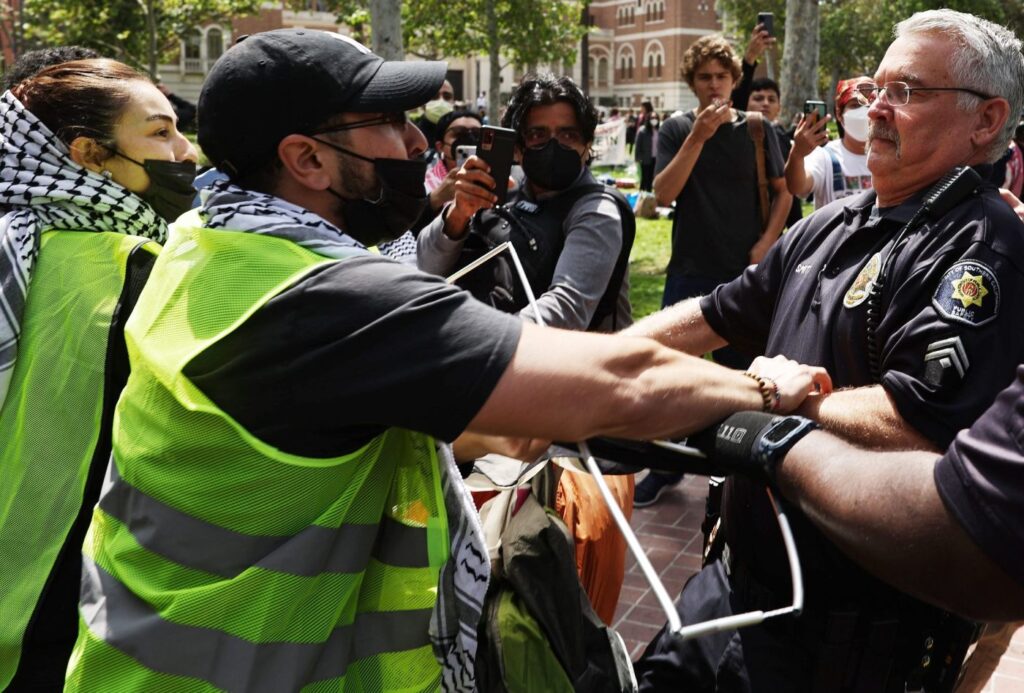
With commencement ceremonies a week away and pro-Palestine protests continuing, USC implemented updated campus-entry procedures Thursday as it remains under a state of heightened security.
According to the university, all parking garages will remain open, and entry to the campus will be available at three locations — McCarthy Way and Figueroa Street; Watt Way and 34th Street; and McClintock Street and Childs Way.
Entry will still be limited to students, faculty, staff, registered guests and “known vendors with confirmation of work.” Student, staff and faculty ID cards will be scanned at the entryways, and all bags will be subject to search. People wearing masks will be asked to lower them briefly to verify identification, according to the university.
Conditions on the USC campus have remained relatively calm in recent days, a far cry from the scene last week when 93 people were arrested following a mass protest and attempted occupation of Alumni Park.
RELATED: UCLA hoped to avoid police crackdown on protesters. What went wrong?
On Wednesday, dozens of USC faculty members held a march through the campus today in support of protesters, calling in part for amnesty for those who were arrested last week.
The Wednesday march remained peaceful, with some students joining the faculty in the late-afternoon procession. It was held hours after a virtual meeting that was held between members of the campus Academic Senate and USC President Carol Folt, who was joined by Provost Andrew Guzman.
Folt wrote on social media Wednesday afternoon that the meeting was held “to explain our reasoning and answer their thoughtful and direct questions about our recent decisions.”
“Rich & sometimes opposing views are essential to a great university,” Folt wrote. “Trust is built every day & we hope this was a step forward.”
Some additional protesters marched on the outskirts of USC Wednesday night. Organizers of a May Day rally and march that began in MacArthur Park late Wednesday afternoon had previously announced plans to walk to the campus in a show of support for protesters.
Folt on Tuesday met for a second straight day with representatives of the protesters who have been demonstrating on the campus over the past week. The session appeared to have limited results, with protesters continuing to press their demands, which include divestment from Israel and from companies with financial ties to Israel.
“I had a second meeting today with the same group from the encampment,” Folt said in a statement Tuesday following the meeting. “We brought some very specific proposals that would address concerns they had about the endowment, which they have said is one of their most important issues. I deeply respect the passion they feel for their cause and recognize the pain and suffering taking place in our own community as well as in the Middle East. Unfortunately, they seemed more interested in having me issue a political statement in support of their viewpoint as opposed to coming up with practical solutions to resolve the situation.”
Speaking to a reporter with the independent student-led media platform Annenberg Media after the meeting, Folt said, “I hope we continue to have meaningful conversations,” she said, calling the dialogue “interesting and important.”
In a statement Tuesday night, the USC Divest from Death Coalition wrote it was “once again … deeply disappointed” after its second meeting with Folt, General Counsel Beong-soo Kim and Vice President of Student Life Monique Allard.
According to the protesters, Folt told them “supposedly less than 2% of USC’s endowment is invested in companies actively contributing to the genocide,” which they calculated as $152 million.
“The administration is aware of where its money goes, and chooses to withhold information from its communities,” organizers wrote. “Transparency is within reach: they simply refuse and defer to bureaucratic internal processes that fail to meet any of our demands.”
Folt and other administrators also “refuse to acknowledge the genocide in Palestine,” organizers wrote, despite negotiators in the meeting “informing her of the numerous international bodies, genocide scholars, human rights organizations, and the overwhelming majority of the world who recognize its factual legitimacy.”
“We do not want a ‘political statement’ from USC, as Folt alleges in her inaccurate account of our meeting,” the statement read. “We demand a ‘practical solution’ in the form of divestments and disclosures.”
Protest participants have accused USC of inflaming the issue by canceling a commencement speech by pro-Palestinian valedictorian Asna Tabassum.
Although police broke up the attempted occupation of Alumni Park last week, protesters re-established a camp on the campus over the weekend, and it has been allowed to remain in place.
Related Articles
UCLA hoped to avoid police crackdown on protesters. What went wrong?
UCI students say meeting tentative with administration as Chapman University encampment forms
Campus protest calls to ‘divest now’ at Southern California colleges shine spotlight on complex issue: endowments
Israel-Hamas war a thorny issue for Southern California Democrats
Biden says ‘order must prevail’ during campus protests over the war in Gaza
USC became a focal point of Southern California Palestinian protests following its decision to cancel Tabassum’s commencement speech in response to complaints about online posts that critics called antisemitic. USC officials insisted the move was solely a security issue, not a political decision.
As tensions continued mounting — leading to last Wednesday’s mass protest — the university eventually opted to cancel its May 10 main stage commencement in Alumni Park altogether but vowed to move forward with the usual array of smaller satellite graduation ceremonies for the school’s individual colleges. Those ceremonies are set to begin May 8.
